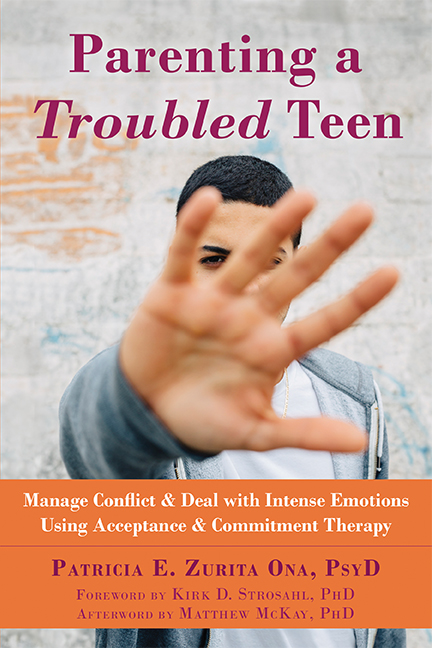By Patricia Zurita Ona, PsyD, author of Parenting a Troubled Teen
When parents or caregivers are raising a teen struggling with emotion regulation, they’re facing a double challenge: (1) they cannot choose what their teens feel, think, or how they behave, and (2) they cannot choose what they feel think, feel, or sense in those moments either. Working with parents like these requires a different intervention. When we invite parents to look at how their parenting behavior could trigger their teens, we can help them shift from asking What’s wrong with my kid? to What can I do differently? And that’s where acceptance and commitment therapy (ACT) becomes handy.
Here are some of the initial steps to work with these parents from an ACT frame:
- Create with parents an inventory of all the strategies they have used to manage their teens’ behaviors.
(e.g., searching for the best therapy, the best medication, talking to their teens, reprimanding their teens, saying “no,” stop talking to them, giving up, removing privileges).
- Look at the workability of each one of those responses.
Do these responses work in the short term? Here is what’s important: sometimes parents’ responses stop the teens’ behavior in the moment, and yet, in the long term, it is important to ask parents: are these behaviors taking you closer or further away from the parent you want to be? Do those responses help the relationship with your teen?
- Check with parents if it’s really helpful to continue pursuing these responses.
- Ask the parents if we can start paying attention to what they go through when their kids say or do something that is upsetting to them.
- Invite parents to notice and name the thoughts that come up with when getting triggered by their teens’ behaviors.
Through brief experiential exercises, help parents to notice past, future, labeling, ruling thoughts, or narratives about their teens or themselves that show up when feeling triggered (e.g., he’s never going to change; nothing is going to work; I suck as a parent).
- Assist parents in noticing all the different emotions they go through when getting upset with their kids.
Through brief awareness exercises, support parents in noticing what happens in their body, the feelings associated with those sensations, and their go-to actions: What do they feel like doing in those moments?
- Introduce the “cycle of conflict” as a frame to understand the parents’ struggles with their teens.
When mapping a moment of conflict parents had with their teens, here are the key questions: When your teen did “x,” what did your mind come up with? What did you feel, did you notice anything in your body, and what did you do? Next, what did your teen do in response? And so on. It’s important to highlight that the parents’ behavior is also a trigger for their teens’ behavior, and based on their responses, a conflict can be initiated or de-escalated.
Patricia E. Zurita Ona, PsyD, is director of the East Bay Behavior Therapy Center and adjunct professor at the Wright Institute. She has significant experience working with children, adolescents, and adults with mood, anxiety, and body-image concerns; particular areas of expertise are obsessive-compulsive disorder (OCD) and post-traumatic stress disorder (PTSD). Zurita Ona also provides specialized services for individuals struggling with emotional dysregulation problems, such as borderline personality disorder (BPD), with or without self-harm and suicidal behaviors. She is coauthor of Mind and Emotions, a universal protocol for emotional disorders that has received a “Self-Help Seal of Merit” from the Association for Behavioral and Cognitive Therapies (ABCT).



 Why Journaling Is Especially Helpful to Adult Children of Emotionally Immature Parents
Why Journaling Is Especially Helpful to Adult Children of Emotionally Immature Parents